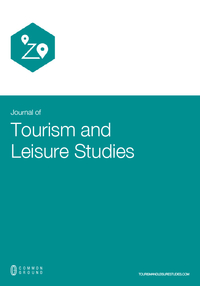Godovykh, M. (2024). Transformative experiences in tourism: where, when, with whom, and how does tourists’ transformation occur?. Frontiers in Sustainable Tourism, 3, 1377844. https://doi.org/10.3389/frsut.2024.1377844
Travel experiences have the potential to induce significant changes in tourists. This paper aims to delineate directions for understanding the where, when, with whom, and why of transformative experiences in tourism, proposing future research directions across various dimensions of this multifaceted topic. The Transformative Experience Diagram is presented as a guide to addressing questions about where, when, with whom, and why travel transformation occurs. In addition to conceptualizing the process of tourist transformation and proposing a framework for future research, this perspective paper has the potential to influence tourism management practices by guiding the design of experiences that trigger tourists’ transformation, positively impacting personal growth, and enhancing the wellbeing of travelers.
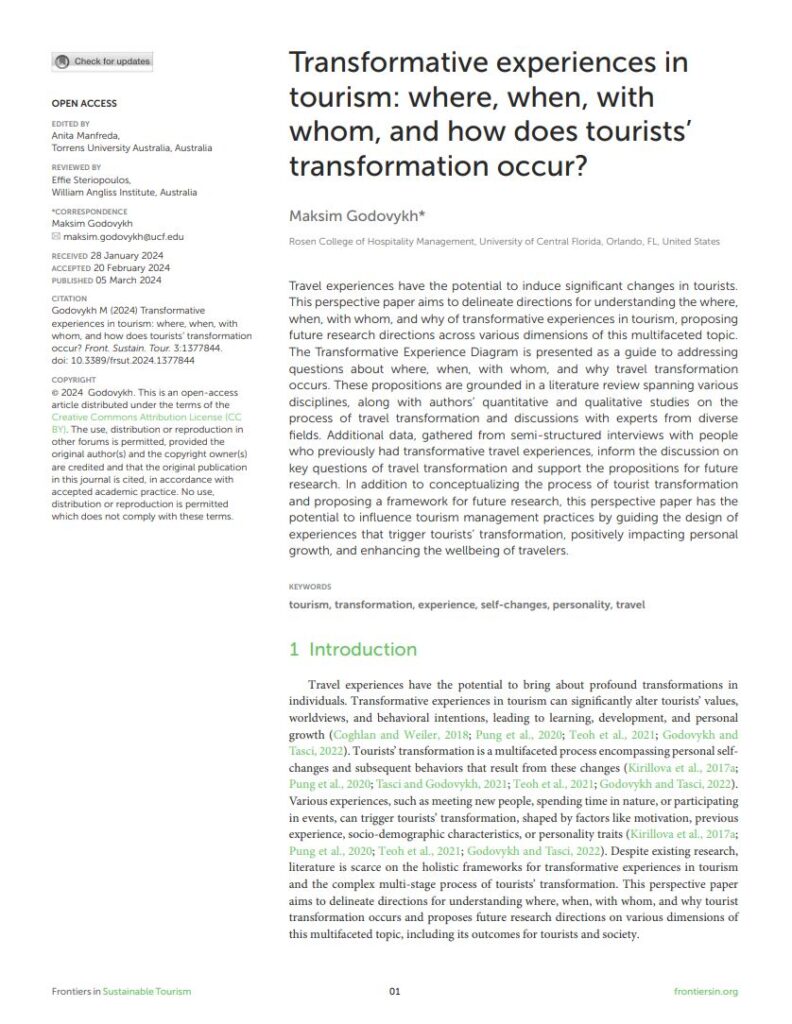
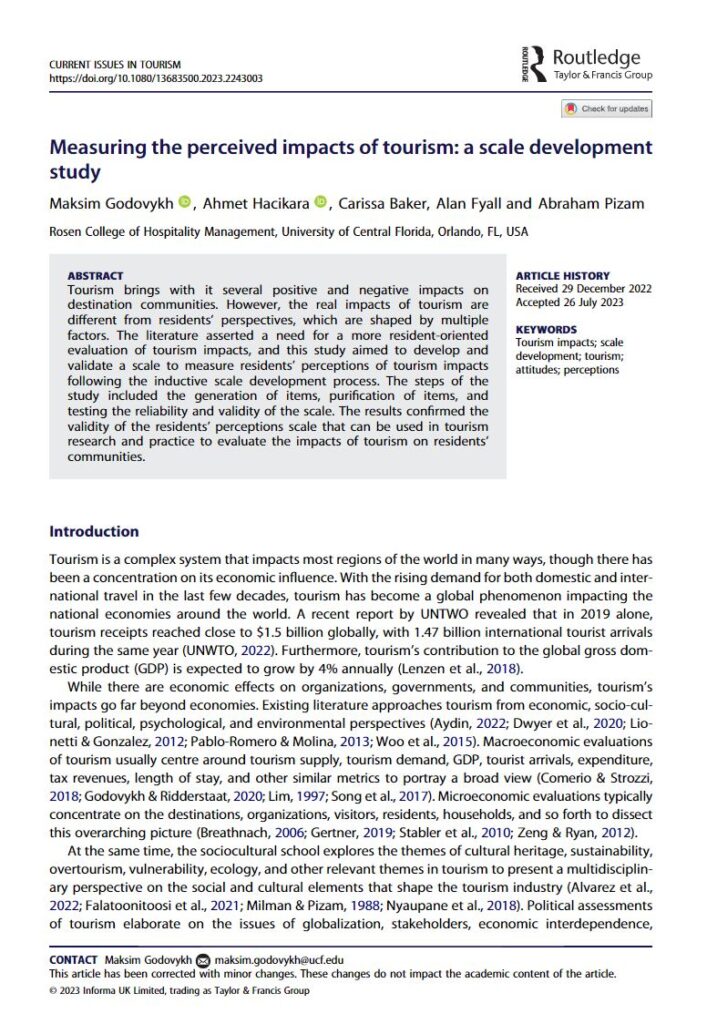
Godovykh, M., Hacikara, A., Baker, C., Fyall, A., & Pizam, A. (2023). Measuring the perceived impacts of tourism: A scale development study. Current Issues in Tourism, 1-17. https://doi.org/10.1080/13683500.2023.2243003
Tourism brings with it several positive and negative impacts on destination communities. However, the real impacts of tourism are different from residents’ perspectives, which are shaped by multiple factors. The literature asserted a need for a more resident-oriented evaluation of tourism impacts, and this study aimed to develop and validate a scale to measure residents’ perceptions of tourism impacts following the inductive scale development process. The steps of the study included the generation of items, purification of items, and testing the reliability and validity of the scale. The results confirmed the validity of the residents’ perceptions scale that can be used in tourism research and practice to evaluate the impacts of tourism on residents’ communities.
Godovykh, M., Fyall, A., & Baker, C. (2024). Sustainable Labels in Tourism Practice: The Effects of Sustainable Hotel Badges on Guests’ Attitudes and Behavioral Intentions. Sustainability, 16(6), 2484. https://doi.org/10.3390/su16062484
Sustainable practices are becoming increasingly important to tourists and hotel guests. As a result, destinations, hotels, and booking platforms are implementing eco-friendly practices and displaying sustainable badges to communicate their efforts to guests. This study aimed to explore the effects of the presence of sustainable badges and the awareness of sustainable practices on tourists’ attitudes and behavioral intentions using an experimental design. The study’s results provided empirical evidence that the presence of a sustainable badge could have a positive impact on guests’ attitudes toward a hotel and intentions to book a hotel. These results contributed to the body of knowledge on the impact of sustainable practices, addressed an attitude–behavior gap between tourists’ attitudes and behavioral intentions, and provided valuable insights for destination management organizations, hotel managers, booking platforms, and policymakers interested in promoting sustainable tourism practices.
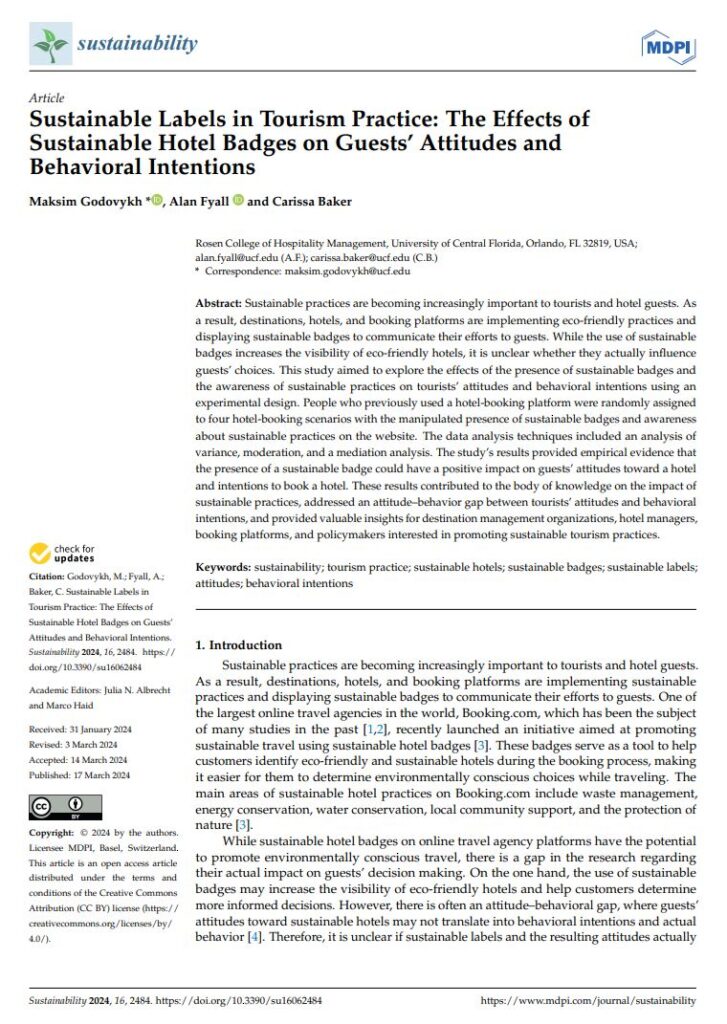
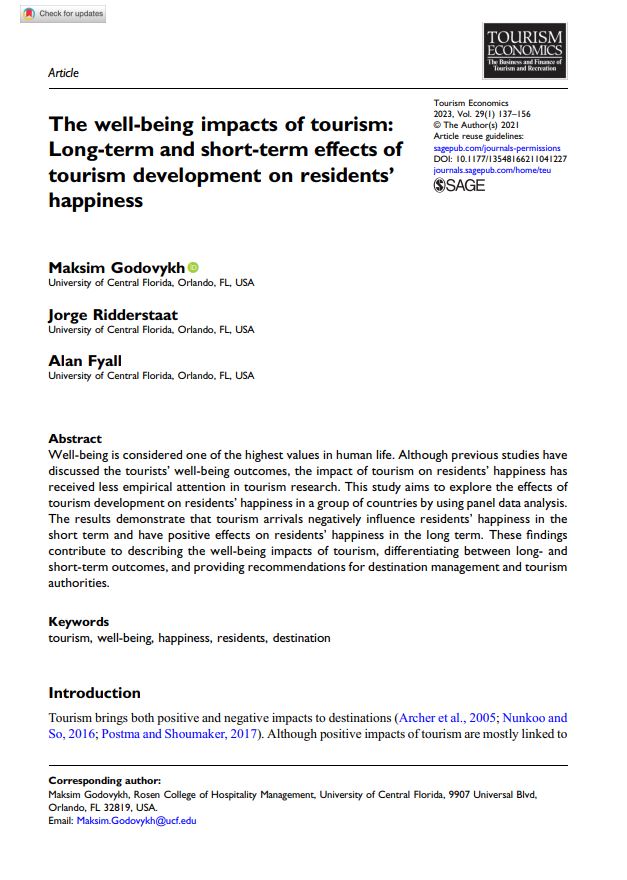
Godovykh, M., Fyall, A., & Ridderstaat, J. (2023). The well-being impacts of tourism: Long-term and short-term effects of tourism development on residents’ happiness. Tourism Economics, 29(1), 137-156. https://doi.org/10.1177%2F13548166211041227
Well-being is considered one of the highest values in human life. Although previous studies have discussed the tourists’ well-being outcomes, the impact of tourism on residents’ happiness has received less empirical attention in tourism research. This study aims to explore the effects of tourism development on residents’ happiness in a group of countries by using panel data analysis. The results demonstrate that tourism arrivals negatively influence residents’ happiness in the short term and have positive effects on residents’ happiness in the long term. These findings contribute to describing the well-being impacts of tourism, differentiating between long- and short-term outcomes, and providing recommendations for destination management and tourism authorities.
Godovykh, M., & Pizam, A. (2023). Measuring patient experience in healthcare. International Journal of Hospitality Management, 112, 103405. https://doi.org/10.1016/j.ijhm.2022.103405
Understanding patient experience is crucial as it influences patient satisfaction, perceived quality of healthcare services, loyalty to physicians and providers, as well as patient health and well-being. However, the multidimensional, long-lasting, affective, and dynamic nature of patient experience demands using new metrics and emerging methodology for measurement. This research note aims to review the potential approaches to measuring patient experience in healthcare, provide a typology of patient experience metrics, and call for further research on evaluating patient experience and analyzing its effects on health outcomes.
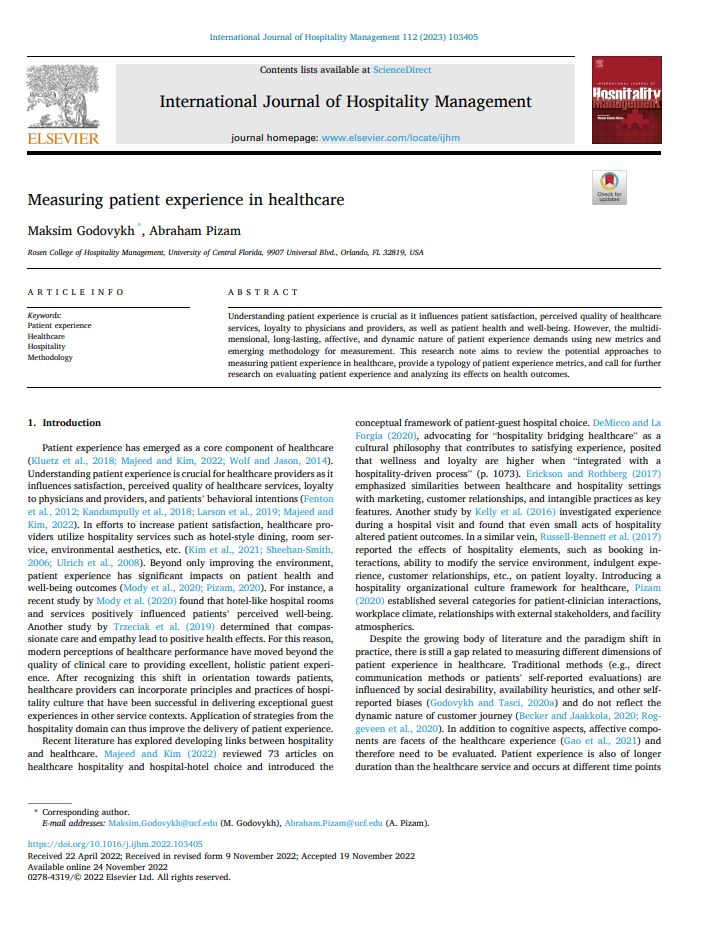
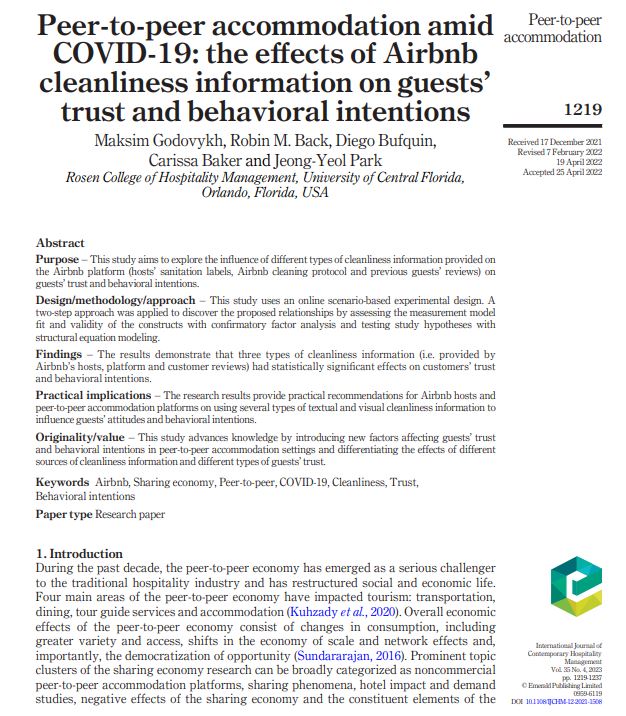
Godovykh, M., Back, R. M., Bufquin, D., Baker, C., & Park, J. Y. (2023). Peer-to-peer accommodation amid COVID-19: the effects of Airbnb cleanliness information on guests’ trust and behavioral intentions. International Journal of Contemporary Hospitality Management. https://doi.org/10.1108/IJCHM-12-2021-1508
This study aims to explore the influence of different types of cleanliness information provided on the Airbnb platform (hosts’ sanitation labels, Airbnb cleaning protocol and previous guests’ reviews) on guests’ trust and behavioral intentions. This study uses an online scenario-based experimental design. A two-step approach was applied to discover the proposed relationships by assessing the measurement model fit and validity of the constructs with confirmatory factor analysis and testing study hypotheses with structural equation modeling. The results demonstrate that three types of cleanliness information (i.e. provided by Airbnb’s hosts, platform and customer reviews) had statistically significant effects on customers’ trust and behavioral intentions. The research results provide practical recommendations for Airbnb hosts and peer-to-peer accommodation platforms on using several types of textual and visual cleanliness information to influence guests’ attitudes and behavioral intentions.
Godovykh, M. & Tasci, A. D. A. (2022). Emotions, feelings, and moods in tourism and hospitality research: Conceptual and methodological differences. Tourism and Hospitality Research, 22(2), 247-25. https://doi.org/10.1177/14673584211039867
Researchers often tend to use the words emotions, feelings, moods, and affect interchangeably, which creates confusion in both conceptual and methodological domains of tourism and hospitality research. However, the insights from neuroscience and psychology demonstrated that there are fundamental differences between these concepts, including their causes, duration, intensity, and outcomes. This research note aims to discuss conceptual and methodological aspects related to using emotions, moods, feelings, and affect, provide comprehensive definitions, and outline opportunities to capture them comprehensively in tourism and hospitality research.
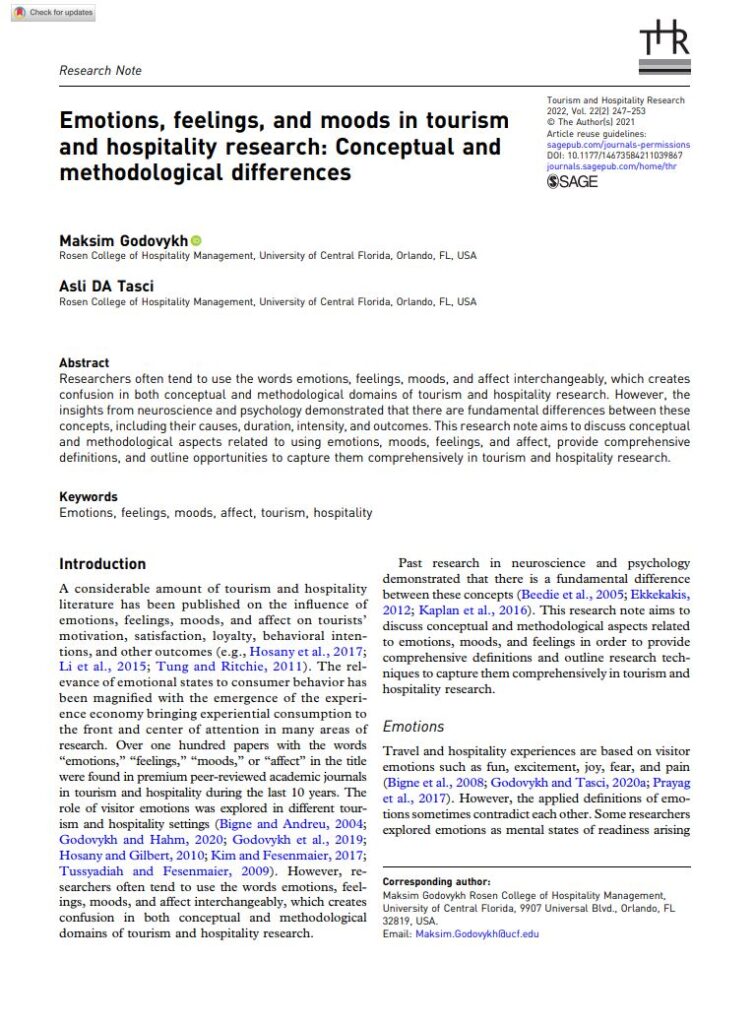

Godovykh, M., Fu, X., & Leung, X. Y. (2023). Humor on Destination Websites: Effects of Humor on Attitudes and Visit Intentions. Tourism Analysis, 28, 371-386. https://doi.org/10.3727/108354223X16837426437308
Humor is an important technique that can be applied in destination marketing to attract potential travelers. This study used a scenario-based experimental design to explore the effects of humor on destination websites. The results demonstrate that both the content of humor and the temporal distance of the visit significantly influence tourists’ attitudes and travel intentions, which are mediated by website trust. The relationships between humor content and visit intentions are stronger when travelers are promotion focused rather than prevention focused, and when they are more familiar with destination websites. This study contributes to knowledge and practice by highlighting humor as an essential component of destination website design and providing practical recommendations for destination marketing and management.
Godovykh, M., Fyall, A., & Pizam, A. (2022). Positive health impacts of tourism. In R. Nankoo et al. (Eds.) Handbook on Tourism, Public Health, and Wellbeing (pp. 124-136). Edward Elgar Publishing.
In the tourism literature, the topic of health is traditionally connected with medical tourism outcomes. People travel outside their healthcare jurisdiction in order to receive positive health outcomes through medical or wellness treatments at remote destinations (Connell, 2006). Medical tourism might generate positive health impacts for local communities by improving the availability and accessibility of healthcare services. However, there are other direct and indirect pathways of the influence of tourism development on residents’ physical and mental health through positive emotions and social interactions with visitors, which also demands additional investigation in tourism research.
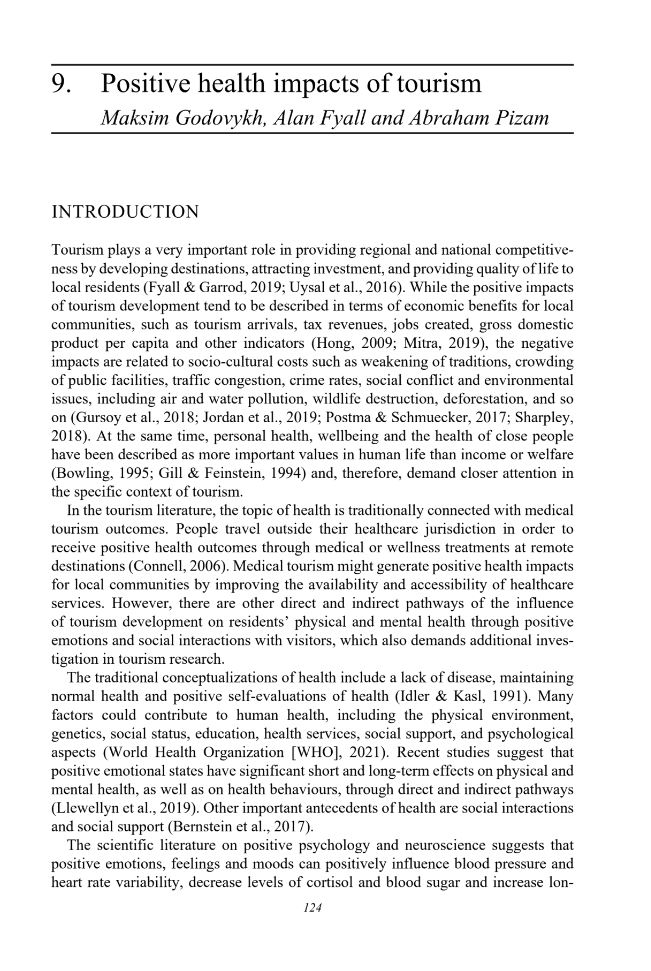

Godovykh, M., Fyall, A., Pizam, A., & Ridderstaat, J. (2022). Evaluating health impacts of tourism: Methodological issues and opportunities. Academica Turistica – Tourism and Innovation Journal, 15(1), 43-52.
https://academica.turistica.si/index.php/AT-TIJ/article/view/330
Tourism brings with it both positive and negative health impacts on local communities. Although the topic of health in tourism is traditionally associated with tourists’ health, there are potential opportunities to study the influence of tourism on residents’ health as well. This study aims at exploring the direct and indirect effects of tourism development on residents’ health through income and environmental pollution in the case of several European countries. The long-term and short-term relationships among tourism arrivals, emissions, residents’ income, and health were estimated using a generalized least squares (gls) approach. The results demonstrate that tourism arrivals bring significant short-term and long-term impacts on residents’ health directly and indirectly through environmental pollution and residents’ income. Several important theoretical and practical implications are related to considering the long-term health impacts as more important outcomes of tourism development and providing recommendations for destination management organizations and governmental authorities.
Godovykh, M. (2022). Measuring affective components of customer experience in tourism. In R. Rather & D. Jaziri (Eds.), Contemporary approaches studying CX in tourism research. Emerald.
The most commonly described components of customer experience include cognitive and affective aspects. However, the subjective self-reported methods traditionally applied in tourism research cannot fully represent the instant, dynamic, and affective nature of customer experience. Therefore, there is a need for moment-based approaches and longitudinal methods in tourism research. The chapter provides a selective review of measures that can be used to assess the affective aspects of customer experience. Taking into account the advantages and limitations of each method, the integration of self-reported scales, moment-based psychophysiological techniques, and longitudinal methods should be considered as the best approach to measuring affective components of customer experience in tourism. This holistic interdisciplinary approach will help researchers and tourism practitioners understand the relationship between affective and cognitive components of tourists’ pre-visit, onsite, and post-visit experience, as well as evaluate the effectiveness of marketing campaigns, identify weak points of tourists’ customer journey, and maximize total travel experience.
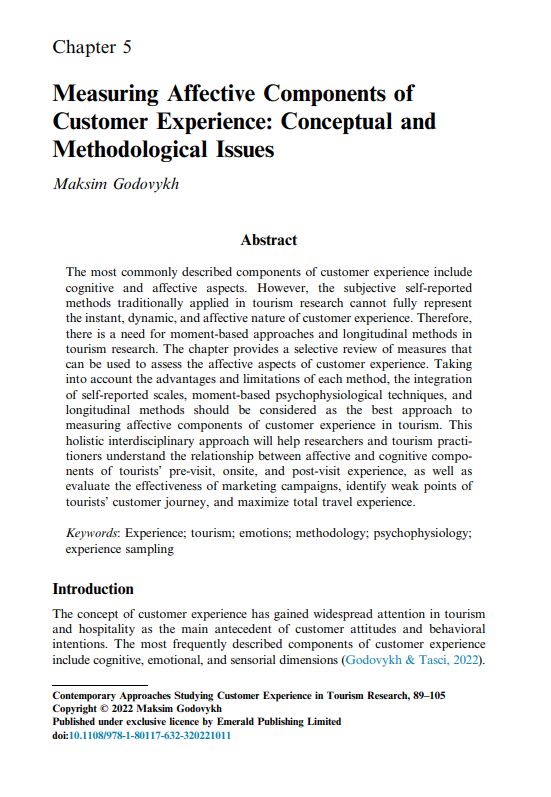
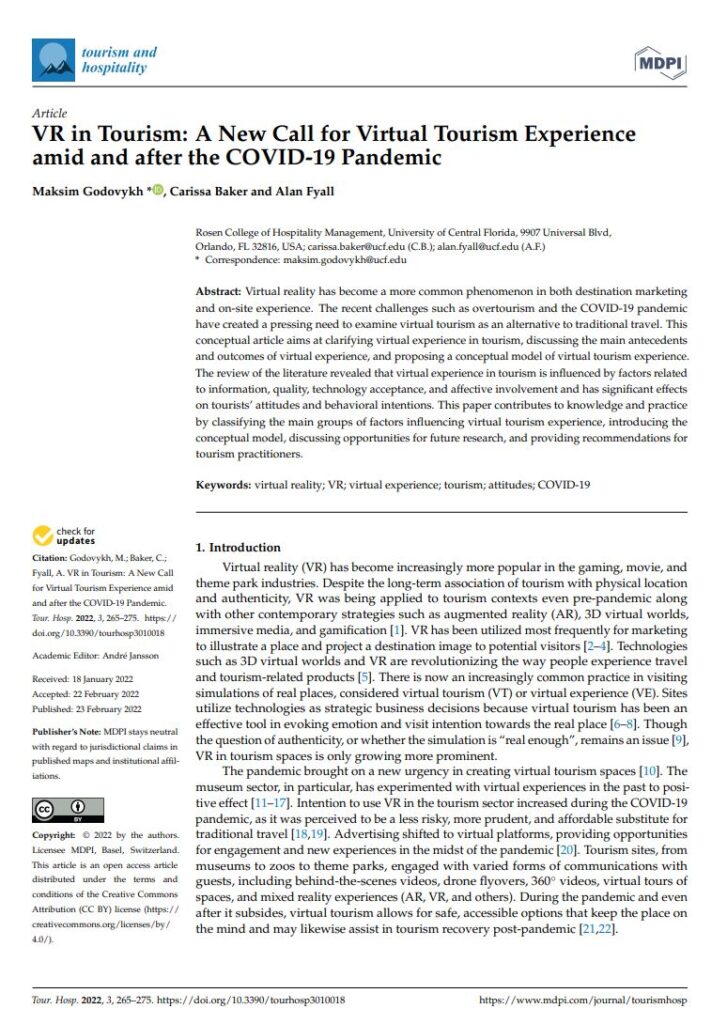
Godovykh, M., Baker, C., & Fyall, A. (2022). VR in Tourism: A New Call for Virtual Tourism Experience amid and after the COVID-19 Pandemic. Tourism and Hospitality, 3(1), 265-275.
https://doi.org/10.3390/tourhosp3010018
Virtual reality has become a more common phenomenon in both destination marketing and on-site experience. The recent challenges such as overtourism and the COVID-19 pandemic have created a pressing need to examine virtual tourism as an alternative to traditional travel. This conceptual article aims at clarifying virtual experience in tourism, discussing the main antecedents and outcomes of virtual experience, and proposing a conceptual model of virtual tourism experience. The review of the literature revealed that virtual experience in tourism is influenced by factors related to information, quality, technology acceptance, and affective involvement and has significant effects on tourists’ attitudes and behavioral intentions. This paper contributes to knowledge and practice by classifying the main groups of factors influencing virtual tourism experience, introducing the conceptual model, discussing opportunities for future research, and providing recommendations for tourism practitioners.
Godovykh, M. & Tasci, A. D. A. (2022). Developing and validating a scale to measure tourists’ personality change after transformative travel experiences. Leisure Sciences. https://doi.org/10.1080/01490400.2022.2060882
Tourist transformation has recently received ample attention. Although personality traits are considered to be overall stable across time, there is evidence that personality might change under the influence of different environmental and contextual factors such as those offered in transformative travel experiences. This study developed and validated a scale to measure travelers’ personality changes after transformative travel experiences. The steps of the study include personality change scale item generation, scale purification, and construct validation with principal component analysis and confirmatory factor analysis. The study results indicated the validity of a six-dimensional tourist transformation scale that may be effective in capturing travelers’ personality change through travel experiences.
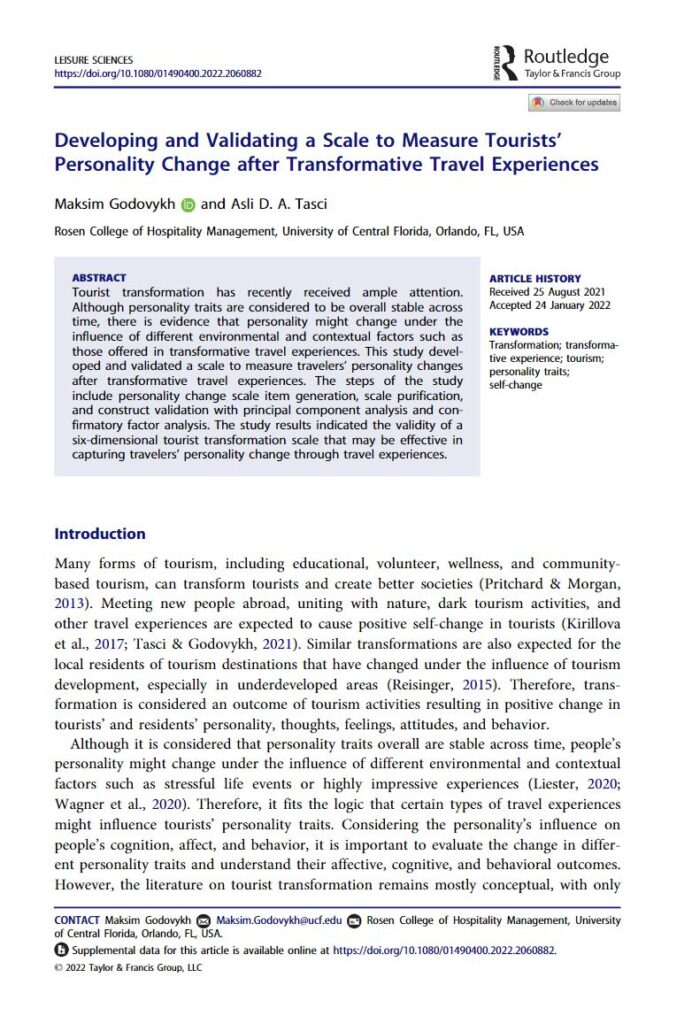
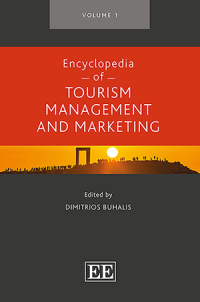
Godovykh, M., & Pizam, A. (2022). Risk Perceptions in Tourism. In Encyclopedia of Tourism Management and Marketing (pp. 1-3). Edward Elgar Publishing. http://dx.doi.org/10.4337/9781800377486.risk.perceptions
Risk perceptions are defined as intuitive and subjective evaluations of the probability and characteristics of negative outcomes. These perceptions of risks differ from actual tangible risks, as they are influenced by socio-cultural, cognitive, emotional, and contextual factors, and have an impact on individuals’ feelings, attitudes, and behavioral intentions, even when the tangible risk is minimized. Therefore, it is crucial to comprehend the primary factors that influence risk perceptions, determine the relative significance of various factors, and investigate the effects of perceived risks on tourists’ emotions, perceptions, and behavior. The conceptual model of risk perceptions in tourism includes affective, cognitive, individual, and contextual factors (Godovykh, Pizam & Bahja, 2021). Positive and negative emotional states have effects on tourists’ ability to manage negative information and deal with negativity biases. Cognitive factors are related to knowledge about the risks, risks’ gravity, risk elimination activities, etc. For example, tourists’ familiarity with theme parks together with their previous experience can significantly reduce their risk perceptions of riding roller coasters. Contextual factors include social and political issues, information framing, availability of alternative sources of information, etc. Individual factors are related to cultural differences, personality traits, generation groups, cognitive biases, and prior experience. Tourists’ risk perceptions in turn influence tourists’ behavioral outcomes such as visit intentions, willingness to recommend the trips, etc.
Godovykh, M., & Baker, C. A. (2022). Hospitality art: A research note on the main factors affecting attractiveness of visual art in Airbnb settings. Journal of Hospitality and Tourism Management, 51, 401-405. https://doi.org/10.1016/j.jhtm.2022.04.014
While art has been mentioned in hospitality settings, there is a gap in the literature on the effects of art on guests’ outcomes. In this competitive market, emphasizing art in the creation of e-servicescapes that promote spaces could assist with altering behavioral intentions, as aesthetic values override functional ones in hotel advertising. Utilizing art pieces in lodging may contribute to guest satisfaction considering the holistic benefits of aesthetic experience that include facets as significant as satisfying the spiritual needs of guests and the well-being needs of hotel employees. Airbnb has been previously presented as the most developed peer-to-peer accommodation platform that currently outperforms hotels in experience dimensions and less tangible areas. This research note aims to discuss the main factors affecting the attractiveness of art in the Airbnb context and advocate for further research on the effects of art on guests’ attitudes and behavioral intentions in different hospitality settings.


Godovykh, M., Fyall, A., Pizam, A., Hancer, M., & Cassisi, J. (2022). Virtual versus face-to-face events: The effects of event type on attendees’ attitudes and behavioral intentions. Event Management, 26(8), 1689-1706.
http://dx.doi.org/10.3727/152599522X16419948694775
The recent situation with COVID-19 led to significant changes in the event industry and forced event planners to organize virtual events. However, virtual events are lacking social interactions and are characterized by lower levels of engagement. This study aims at exploring relationships between event types and attendees’ behavioral intentions using experimental design. The measurement model fit and constructs’ validity were assessed with confirmatory factor analysis, while the study hypotheses were tested with the structural equation modeling. The results demonstrate that event types have significant effects on attendees’ risk perceptions that influence attendees’ visit intentions. The study also revealed significant moderating effects of attendees’ age on the relationship between event type and visit intentions. The study provides important theoretical and managerial implications by introducing new factors affecting attendees’ behavioral intentions amid the COVID-19 pandemic, describing the relationship between risk perceptions and attendees’ behavioral intentions, and providing practical recommendations for event planners.
Godovykh, M., & Tasci, A.D.A. (2020). Customer experience in tourism: A review of definitions, components, and measurements. Tourism Management Perspectives, 35, 1- 19. https://doi.org/10.1016/j.tmp.2020.100694
The concept of customer experience has received increasing attention in different disciplines. However, the pathway for handling experience has not been clearly set forth due to divergent conceptualizations and insufficient measures of customer experience. This study critically analyzes empirical and conceptual literature on experience, provides a holistic definition of experience, proposes an experience model with four main components (emotional, cognitive, sensorial, and conative), and suggests using a combination of several measures to capture the totality of tourism experience at pre-visit, onsite, and post-visit stages. These suggestions provide important implications for researchers and practitioners by offering new ways to explore customer interaction with tourist products, detect affective and sensory components leading to important consumption outcomes, investigate individual impacts of anticipation, onsite experience, and recall, as well as analyze effectiveness of destination marketing practices.
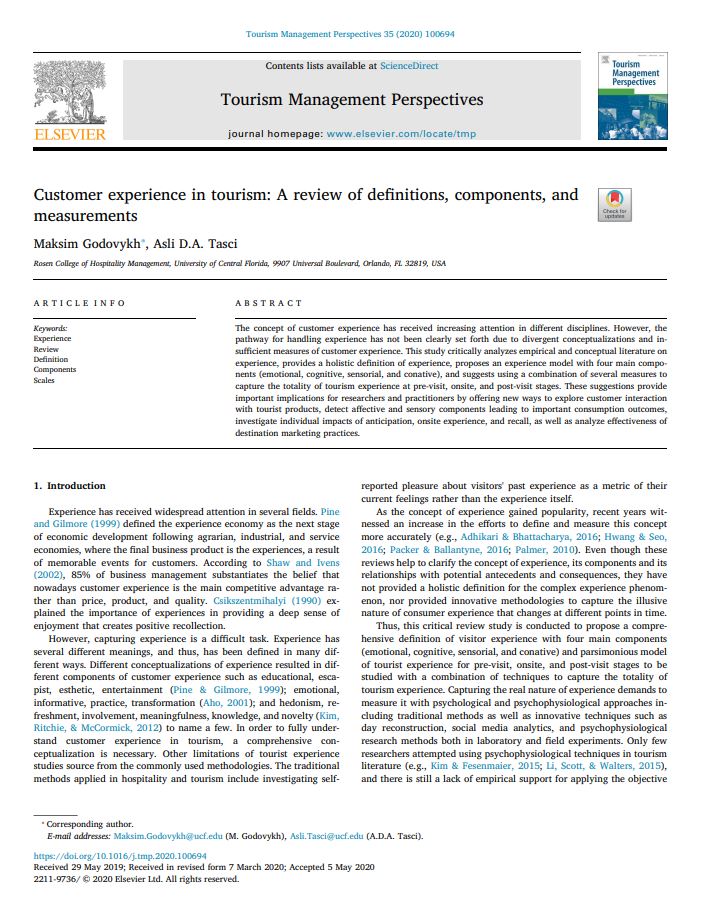

Godovykh, M., & Ridderstaat, J. (2021). Health outcomes of tourism development: Longitudinal study of the impact of tourism arrivals on residents’ health. Destination Marketing and Management, 17, 1-7. https://doi.org/10.1016/j.jdmm.2020.100462
This study investigates the influence of the number of tourism arrivals on the physical health of local people in one of the most-visited destinations in the world. Although the literature traditionally describes the economic, social, and cultural impacts of tourism, there is a gap related to the effects of tourism on residents’ health. The methodology involves applying the limited-information maximum likelihood instrumental variable approach. The results demonstrate that tourism arrivals negatively influence residents’ health in the short term, yet have positive impacts on long-term health outcomes. The study contributes to the theory and practice by offering a new approach to physical health outcomes of tourism, demonstrating the superiority of long-term positive impacts of tourism over short-term negative outcomes, and emphasizing the importance of evaluating the health impacts of tourism for destination marketing and management.
Godovykh, M., Ridderstaat, J., Baker, C., & Fyall, A. (2021). COVID-19 and tourism: Analyzing the effects of COVID-19 statistics and media coverage on attitudes towards tourism. Forecasting, 3, 870-883. https://doi.org/10.3390/forecast3040053
COVID-19 has significantly influenced tourism, including tourists’ and residents’ attitudes toward tourism. At the same time, attitudes and consumer confidence are important for economic recovery in the tourism sector. This study explores the effects of the COVID-19 pandemic on people’s attitudes toward tourism by analyzing time-series data on the number of COVID-19 positive cases, vaccinations, news sentiment, a total number of daily mentions of tourism, and the share of voice for positive and negative sentiment toward tourism. The applied data analysis techniques include descriptive analysis, visual representation of data, data decomposition into trend and cycle components, unit root tests, Granger causality test, and multiple time series regression. The results demonstrate that the COVID-19 statistics and media coverage have significant effects on interest in tourism in general, as well as the positive and negative sentiment toward tourism. The results contribute to knowledge and practice by describing the effects of the disease statistics on attitudes toward tourism, introducing social media sentiment analysis as an opportunity to measure positive and negative sentiment toward tourism, and providing recommendations for government authorities, destination management organizations, and tourism providers.
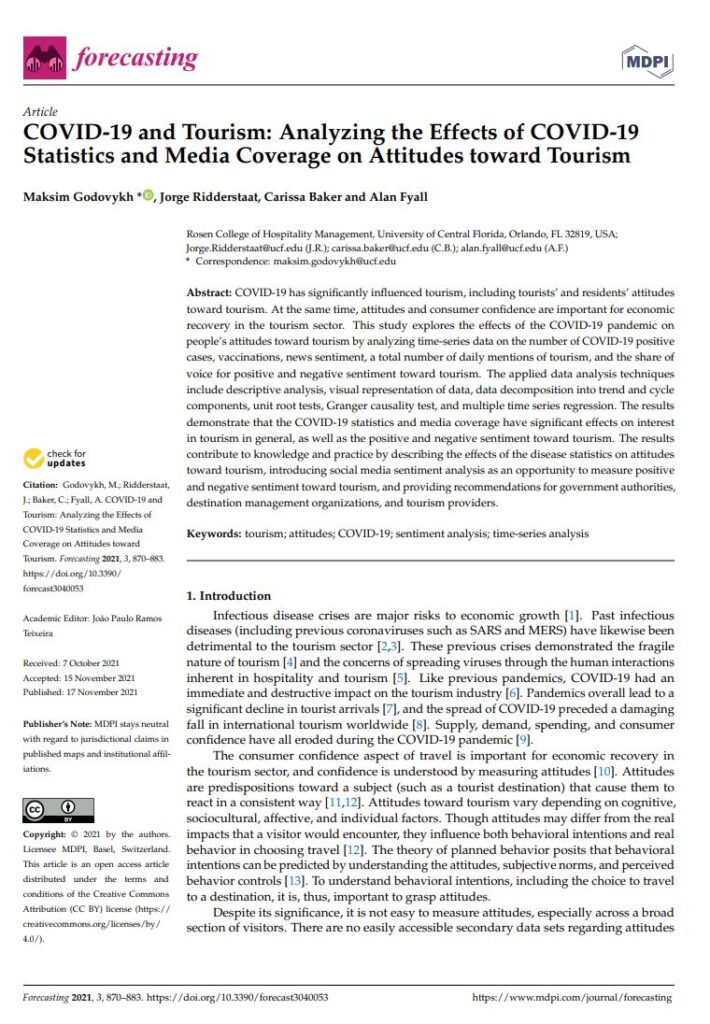

Godovykh, M., Pizam, A., & Bahja, F. (2021). Antecedents and outcomes of health risk perceptions in tourism, following the COVID-19 pandemic. Tourism Review. https://doi.org/10.1108/TR-06-2020-0257
The purpose of this paper is to clarify the concept of perceived risks, identify the main antecedents and outcomes of health risk perceptions and propose a conceptual model of health risk perceptions in tourism. This paper provides a review of the literature on customer risk perceptions, along with their antecedents and outcomes, and proposes a conceptual model of health risk perceptions in tourism. Key findings reveal that the main factors of health risk perceptions can be broadly classified into cognitive, affective, individual and contextual components. The proposed conceptual model of health risk perceptions provides a theoretically integrated overview of relationships between all groups of factors, tourists’ risk perceptions and travel intentions. The paper contributes to theory by offering a new approach to health risk perceptions in tourism, which remain underexplored in previous studies. The literature review adds to the body of knowledge by introducing four main groups of factors affecting tourists’ health risk perceptions, while the conceptual model proposes relationships between these factors, tourists’ risk perceptions and travel intentions.
https://doi.org/10.1108/TR-01-2020-0025Godovykh, M., & Tasci, A.D.A. (2020). The influence of post-visit emotions on destination loyalty. Tourism Review. https://doi.org/10.1108/TR-01-2020-0025
The influence of different factors including emotional states on loyalty has been previously discussed in the literature. However, the influence of post-visit emotions evoked by emotional stimuli on tourist loyalty lacks empirical attention. The purpose of this study is to investigate the effects of post-visit emotional stimuli on destination loyalty. The study applied an online scenario-based experimental design to identify the impact of positive and negative affective pictorial stimuli on destination loyalty. A sample of 500 adult US residents who visited Orlando within the past 12 months was recruited to take part in the experiment. One-way ANOVA was used to compare the loyalty of three groups, two of which were manipulated with emotional stimuli, positive pictures and negative pictures and one control group with no pictures. Results show that it is possible to influence visitor loyalty after visitation. Post-visit exposure to positive emotional stimuli generates higher levels of destination loyalty, while negative emotional stimuli generate lower levels of destination loyalty, in comparison with no stimuli scenario.

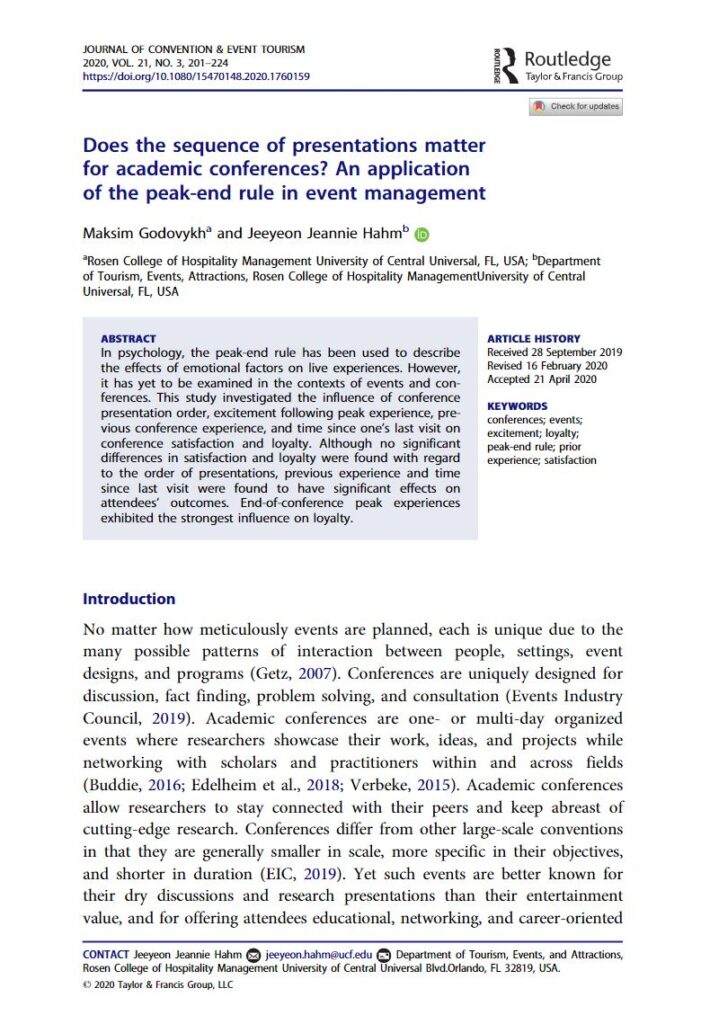
Godovykh, M., & Hahm, J. J. (2020). Does the sequence of presentations matter for academic conferences? An application of the peak-end rule in event management. Journal of Convention & Event Tourism, 21(3), 201-224. https://doi.org/10.1080/15470148.2020.1760159
In psychology, the peak-end rule has been used to describe the effects of emotional factors on live experiences. However, it has yet to be examined in the contexts of events and conferences. This study investigated the influence of conference presentation order, excitement following peak experience, previous conference experience, and time since one’s last visit on conference satisfaction and loyalty. Although no significant differences in satisfaction and loyalty were found with regard to the order of presentations, previous experience and time since last visit were found to have significant effects on attendees’ outcomes. End-of-conference peak experiences exhibited the strongest influence on loyalty.
Godovykh, M., Milman, A., & Tasci, A. D. A. (2020). Theme park experience: Factors explaining amount of pleasure from a visit, time allocation for activities, perceived value, queuing quality, satisfaction, and loyalty. Journal of Tourism and Leisure Studies, 4(2), 1-21. https://doi.org/10.18848/2470-9336/CGP/v04i02/1-21
A considerable amount of literature describes concepts that predict theme park visitor behavior. Although previous studies made an effort to measure the impact of several variables on theme park visitors’ loyalty, there is a lack of empirical attention on the impact of some consumption variables such as previous experience, perceived queuing quality, waiting time, using of virtual queuing, and the role of anticipating and remembering the visit. The current study introduces several new experience concepts that were not previously discussed in the literature: the amount of pleasure from anticipation, visiting, and remembering the experience, and time allocation for waiting in lines, amusement activities, and food consumption. Factors that explain these variables, as well as factors that explain perceived value, queuing quality, satisfaction, and loyalty were investigated through survey data from a cross-sectional study. The results demonstrate that previous theme park experience has significant influence on customer loyalty and explains the amount of pleasure visitors receive from anticipation, remembering, and the actual visiting experience. Another important finding is related to the role of virtual queuing, which has relationships with perceived value, perceived waiting time, perceived queuing quality, satisfaction, loyalty, as well as the amount of pleasure from anticipation, visiting, and remembering the theme park visit. Theoretical and managerial implications and future research directions are discussed.
